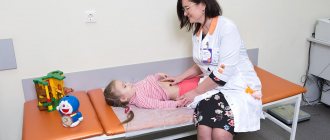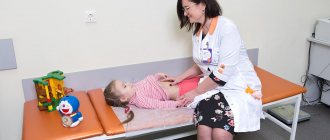Many people complain that something seems to be moving in their stomach, and sometimes this can even be visually determined. This may be due to several factors, however, it is worth remembering that only a qualified doctor can make a diagnosis.
In this case, signs such as:
- bloating;
- movement within;
- muscle mobility;
- strange noises.
The sensation may be quite painful or painless. The reasons for the feeling that something is moving in the stomach can be very different. Among the main reasons are:
- violation of peristalsis of internal organs;
- helminthiasis;
- increased gas formation;
- neoplasms.
That is why it is important to consult a doctor in a timely manner and conduct a comprehensive examination.
Reduction of organs
If the abdominal cavity is inhabited by organisms that came from the external environment, then you will not be able to feel that they are moving. The formation of waves occurs arbitrarily, and a person cannot control this process. Different organs can contract: the stomach or intestines, fallopian tubes or urinary tract.
You can feel movements in different places of the abdominal cavity. Sometimes this happens in a certain direction, since the organs have a certain size and a different number of contractions.
Peristalsis
If you feel like something is moving in your stomach, this may be due to intestinal motility. Wave-like contractions of the hollow organs are observed as food moves through them. They can be felt even through the abdominal wall. Such waves are formed regardless of a person’s desire. Not only the stomach and intestines can contract, but also the urinary tract and fallopian tubes.
The sensation of movement in the abdomen may be chaotic or have a specific direction of movement, as well as a different number of contractions. It all depends on your health and diet. Usually peristalsis is almost invisible and does not cause any particular inconvenience.
Gas formation
With increased gas formation, you can also feel as if something is moving in your stomach. This is a rather delicate problem that cannot be discussed during an evening conversation over tea. Nevertheless, flatulence can cause discomfort.
During increased gas formation, intestinal motility changes and a feeling appears as if something is moving in the stomach. Moreover, this problem is constantly present and does not go away.
Diagnostics
To determine the exact cause that caused the pulsation in the abdomen, a special diagnostic examination is carried out, which includes:
- ultrasound examination of the gastrointestinal tract;
- X-ray;
- computed or magnetic resonance imaging;
- analysis of urine, feces and blood fluid.
Based on the results obtained, the gastroenterologist prescribes adequate treatment with medications.
Parasites as one of the causes of movement
Many helminthic infestations occur without additional symptoms, but some types of worms can cause noticeable movement in the intestines, especially in the left part.
Even if a person observes the rules of personal hygiene, he is not immune from infection. Parasites enter through soil, meat products, poorly washed vegetables and fruits, as well as water. It is especially easy to become infected when climate zones regularly change - in hot countries the risk is much higher.
Parasitic infestations often manifest themselves with additional signs:
- constant constipation alternating with diarrhea;
- severe nausea and frequent vomiting;
- unexplained pain, heaviness in the abdomen;
- excessive or lack of appetite.
Infestations are disguised as symptoms of completely different diseases. With a large number of parasites, cough, dermatological problems, and fever may occur. With prolonged activity of worms, symptoms of intoxication are observed: weakness, dizziness, fever and temperature.
Most parasites can be identified simply by taking blood and stool tests. In rare cases, an ultrasound or x-ray is required.
Types of parasites that most often cause a sensation of movement
Small worms, such as pinworms or roundworms, can multiply quickly, causing gas and other digestive problems. In this case, the patient feels a stirring associated with the movement of gases.
A sense of movement, associated specifically with the activity of parasites, is observed when infected with broad tapeworm, bovine and pork tapeworm. Worms live in the intestines and cause extremely severe intoxication. They are often capable of mechanically injuring the intestines and causing obstruction.
Helminthiasis
If something moves in the stomach, then similar symptoms can be observed in the presence of helminths. The manifestations of parasites in the body can be very diverse. In addition to the movement of helminths in the stomach, a person may suffer from migraines, bronchial asthma, dermatosis and many other diseases.
Worms very rarely cause a sensation of movement, the only exception being enterobiasis. This disease is considered to be a childhood disease, but adults can also be carriers of pinworms. It is transmitted through contact with objects that are contaminated with the eggs of these small worms.
What to do to relieve pain
The implementation of therapeutic measures will depend on the cause that provoked the discomfort in the abdomen and the location of the pulsation.
So, for example, if this condition occurs against the background of an aortic aneurysm, then specialists prescribe drugs of the symptomatic group. If a rupture occurs, only surgery will help.
In case of overeating or diseases of the gastrointestinal tract, the basis of therapy is adherence to a special diet. Treatment with medications depends on which organ is affected.
What other symptoms are there for worms?
Many people wonder why something is moving in the stomach and whether this could be due to the presence of worms in the body. Many types of helminths are localized in the digestive organs, which is why various types of disorders often occur in this area. Some people feel like they have parasites moving in their stomach. This occurs due to increased gas formation.
Worms irritate the digestive organs with the products of their vital activity, which is why flatulence, digestive problems, and pain in the navel area occur. Helminths not only provoke digestive problems, but also release toxins into the body, which negatively affect the state of the nervous system. The more worms in the body, the stronger the signs of intoxication.
Among the main symptoms of the presence of worms in the body are the following:
- migraine;
- temperature increase;
- nausea;
- anemia;
- chronic fatigue.
The patient may suffer from insomnia for a long time, and children may grind their teeth in their sleep. Worms very often provoke skin rashes, and in severe cases can provoke the development of asthma.
The presence of worms in the body greatly affects the immune system, since worms feed on beneficial substances that come with food. As a result, a person simply does not have enough vitamins. Against this background, various chronic diseases may worsen. In advanced cases, parasites can even provoke the development of cancer. This occurs due to constant intoxication, disruption of the immune system, injury to certain organs and chronic lack of nutrients.
Itching in the anus
Itching in the anus is often not a separate symptom, but a completely independent disease with an identical name. In this case, it is considered primary and idiopathic, that is, without obvious causes. However, itching in the anus can also be secondary, that is, it can be a symptom of a disease. In this case, it is necessary to first treat the disease itself.
What causes itching in the anus? We list the main ones:
- Diseases of the rectum are a very common cause of itching in the anal canal. There are many diseases in this group in which this symptom is observed. These are hemorrhoids, condylomas in the anus (pointed), anal fissures, various tumors in the rectal area, chronic proctosigmoiditis and others.
- Gynecological diseases - naturally, this group of causes applies only to itching in the anal canal in women. This symptom may be evidence of vulvovaginitis or any disorder of vaginal secretion.
- Sexually transmitted diseases and infections of the genitourinary system - itching in the anus is a symptom of sexually transmitted diseases such as chlamydia and trichomoniasis. It can appear with chronic prostatitis, which affects almost half of the mature male population of the planet, as well as with urethritis.
- Skin diseases - itching in the anus often accompanies a disease such as psoriasis. But it can also appear as contact dermatitis when using powders, toilet paper or wearing clothes that irritate the skin.
This is not a complete list of reasons that can cause itching in the anus. It can be a symptom of diabetes or liver disease, various fungal infections, an allergic reaction to certain foods or alcohol, a side effect of penicillin, tetracycline or erythromycin, and even a consequence of depression or anxiety.
For whatever reason, itching in the anus occurs, you should seek advice from a proctologist. He will conduct a visual examination of the skin of the anus and prescribe a number of tests and procedures that will help establish an accurate diagnosis. These are blood tests for sugar, urine tests, feces tests for worm eggs and dysbacteriosis, anoscopy, colonoscopy.
Treatment of anal itching
For any treatment of anal itching, it is necessary to take hygienic measures: do not scratch the skin in the anal area, avoid hot baths and long washing in general. In this case, it is necessary to use soap and shampoo that will not increase the itching. You should always ensure that the skin near the anus is dry. To do this, it would be a good idea to use soft pads, which should be changed regularly. Bowel movements should also be regular. To alleviate the condition and speed up the healing of cracks and scratches in the anus, the doctor may prescribe special suppositories and ointments.
You can make an appointment on the clinic’s website or by calling +7,
Your actions
If unpleasant symptoms appear for the first time, then you don’t have to do anything to begin with. Perhaps this is a temporary phenomenon associated with overexertion, stress or hemostasis, which will go away on its own. You probably drank alcohol the day before or overate, which means everything will go away after digestion normalizes.
If symptoms recur or do not subside, you should consult a specialist. In this case, it is advisable to take tests to detect helminths, as well as visit a gastroenterologist and therapist.
When a parasitic disease is detected, complex treatment is indicated, that is, it is important not only to eliminate helminths, but also to normalize the functioning of the gastrointestinal tract, eliminate the inflammatory process and intoxication. Only after this the unpleasant sensations will stop bothering you.
When to sound the alarm
In the case when pulsation in the abdomen is observed for a long time, and is accompanied by painful sensations and other symptoms characteristic of certain pathological processes that could provoke such a condition, it is necessary to immediately seek medical help from a gastroenterologist.
As is known, most often the main provoking factor in the occurrence of throbbing pain is aortic aneurysm . If timely treatment measures are not taken, the possibility of its rupture cannot be ruled out, which entails not very comforting prognoses.









